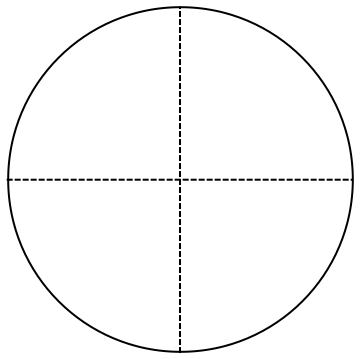- Home
- Geometric Singularities
- Kellogg Problems
This page concerns elliptic eigenvalue problems of the general form
\[ \mbox{ Find } (u,\lambda)\in\mathcal{H}\times\mathbb{C}\mbox{ such
that }\int_\Omega A\nabla u\cdot\nabla v+(\mathbf{b}\cdot\nabla
u+cu)v\,dx = \lambda\int_\Omega \beta uv\,dx\mbox{ for all }v\in \mathcal{H}~,
\]
where \(\mathcal{H}\) is some appropriate subspace of
\(H^1(\Omega)\) which incorporates any (homogeneous) essential boundary conditions.
The Problems
\[\int_\Omega\nabla u\cdot\nabla v\,dx=\lambda\int_\Omega uv\,dx\]
Fix \(\alpha\in(1,2]\) and let \(\Omega\subset \mathbb{R}^2\) be the sector of the unit disk for which \( 0 < r < 1 \) and \( 0 < \theta < \alpha \pi \); when \(\alpha=2\), \(\Omega\) is the unit disk with a slit along the positive \(x\)-axis.
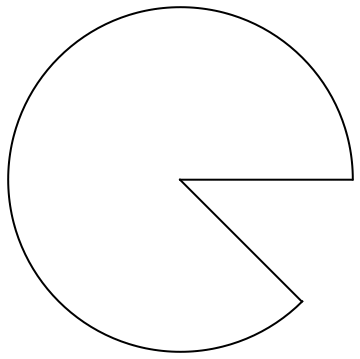
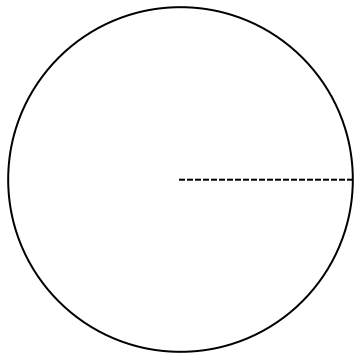
First-Kind Bessel Functions and Their Roots
\[ J_\sigma(z)=\left(\frac{z}{2}\right)^\sigma\sum_{k=0}^\infty\frac{(-1)^k}{k!\Gamma(k+\sigma+1)}\left(\frac{z}{2}\right)^{2k} \quad,\quad j_m(\sigma)=m^{th}\mbox{ positive root of }J_\sigma \]Dirichlet condition on \(r=1\), Dirichlet conditions on \(\theta=0\) and \(\theta=\alpha\pi\)
All eigenpairs doubly-indexed, \( (u_{km},\lambda_{km})\): \[ u_{km}=J_{\sigma_k}(j_m(\sigma_k)\,r)\,\sin(\sigma_k\,\theta)\quad,\quad \lambda_{km}=[j_m(\sigma_k)]^2\quad,\quad \sigma_k=\frac{k}{\alpha}\quad,\quad k\geq 1\;,\; m\geq 1 \]Dirichlet condition on \(r=1\), Neumann conditions on \(\theta=0\) and \(\theta=\alpha\pi\)
All eigenpairs doubly-indexed, \( (u_{km},\lambda_{km})\): \[ u_{km}=J_{\sigma_k}(j_m(\sigma_k)\,r)\,\cos(\sigma_k\,\theta)\quad,\quad \lambda_{km}=[j_m(\sigma_k)]^2\quad,\quad \sigma_k=\frac{k}{\alpha}\quad,\quad k\geq 0\;,\; m\geq 1 \]Dirichlet condition on \(r=1\), Dirichlet condition on \(\theta=0\) and Neumann condition on \(\theta=\alpha\pi\)
All eigenpairs doubly-indexed, \( (u_{km},\lambda_{km})\): \[ u_{km}=J_{\sigma_k}(j_m(\sigma_k)\,r)\,\sin(\sigma_k\,\theta)\quad,\quad \lambda_{km}=[j_m(\sigma_k)]^2\quad,\quad \sigma_k=\frac{2k+1}{2\alpha}\quad,\quad k\geq 0\;,\; m\geq 1 \]Slit Disk (\(\alpha=2\)), Dirichlet/Neumann:
The first ten eigenvalues for \( 0 \leq k \leq 7 \), accurate to all 30 digits shown, up to rounding in the last digit.| k=0 | k=1 | k=2 | k=3 |
|---|---|---|---|
| 7.73333653346596686390263803337 | 12.1871394680951290047505723560 | 17.3507761313694859586686502730 | 23.1993865387331719385298116070 |
| 34.8825215790904790430911907100 | 44.2575594035024472537244889622 | 54.3596015232094873965461826498 | 65.1767709083390084446143156735 |
| 81.7647023194374255502663810252 | 96.0716048388430901772947338831 | 111.109164189343629901279779194 | 126.870681508728170693543652387 |
| 148.385081445043562614168937452 | 167.625712420578303557539528801 | 187.598320803070079647608461010 | 208.298640528527733692491069300 |
| 234.744373345439788620322954495 | 258.919300357440362078091918285 | 283.826822825821542321768305561 | 309.463994348658829866563530533 |
| 340.842757625123711498282368313 | 369.952209262346068631425669745 | 399.794593580023538912908529450 | 430.367756267178609952304627478 |
| 466.680295946200469586902720763 | 500.724381475794183238478665262 | 535.501603402747510461337308750 | 571.010319011209343057658253475 |
| 612.257014004421679312402962975 | 651.235792102542719942360069398 | 690.947838917131069749831094445 | 731.391860906830073076873322232 |
| 777.572924032271491109121826445 | 821.486428982383575833591226923 | 866.133293385950192385198831099 | 911.512472473474305874440881571 |
| 962.628032449008542130660970732 | 1011.47628560801610204045214133 | 1061.05796312084933360076379021 | 1111.37220364314013210781706831 |
| k=4 | k=5 | k=6 | k=7 |
| 29.7145342842106938075714690649 | 36.8818928841180487579063517659 | 44.6899430974683906098000106225 | 53.1291788410994927833576705400 |
| 76.6978978017046035416048785377 | 88.9128264032049384243850896701 | 101.812416292492719069621675283 | 115.388452233110190920437947927 |
| 143.349064446158040032227622255 | 160.537281358588387414948116155 | 178.428565668674780381276777562 | 197.016500904227884270081263232 |
| 229.721824222112591812253100109 | 251.862795845034644081660610462 | 274.716449610594182764748668023 | 298.277762419288576970640911812 |
| 335.827306343422842911542053594 | 362.912943708380157494716304537 | 390.716946367958682711301651648 | 419.235312392571175123581640371 |
| 461.669044944096065292760123739 | 493.695495073021230243253067956 | 526.443956299934073827540705208 | 559.911179211391462545607569442 |
| 607.248454712575419803555986611 | 644.213643759938350432215465654 | 681.903324808450377564783571548 | 720.314813110147188859770072906 |
| 772.566193335015998808613121766 | 814.468904465270548113688850474 | 857.097873102817923700662127041 | 900.450846764162254443718796088 |
| 957.622600730245947047732883970 | 1004.46207234618030305792837226 | 1052.02910294995276439347169279 | 1100.32177730883324768231690129 |
| 1162.41786709784105416490040334 | 1214.19359794648075963125492979 | 1266.69787495878397894333570136 | 1319.92905059524769445013120138 |
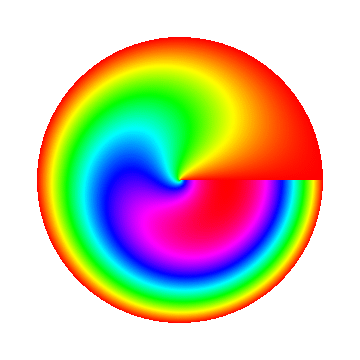
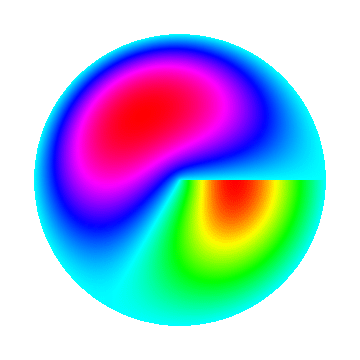
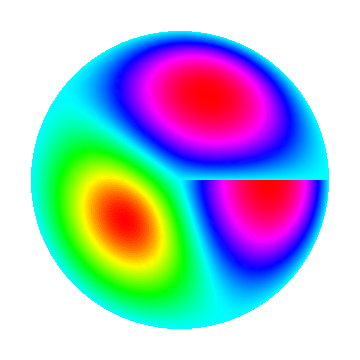
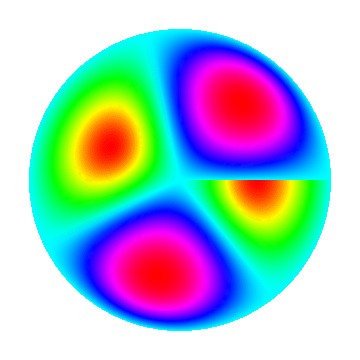

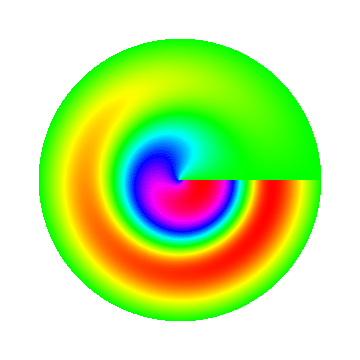
Slit Disk (\(\alpha=2\)), Neumann/Neumann:
The first ten eigenvalues for \( 0 \leq k \leq 7 \), accurate to all 30 digits shown, up to rounding in the last digit.| k=0 | k=1 | k=2 | k=3 |
|---|---|---|---|
| 5.78318596294678452117599575846 | 9.86960440108935861883449099988 | 14.6819706421238932572197777686 | 20.1907285564266299745230737654 |
| 30.4712623436620863990781631750 | 39.4784176043574344753379639995 | 49.2184563216946036702670828470 | 59.6795159441094188805359142004 |
| 74.8870067906951834448890413101 | 88.8264396098042275695104189989 | 103.499453895136580332223632536 | 118.899869163626464070691007678 |
| 139.040284426459849001591423516 | 157.913670417429737901351855998 | 177.520766813804649861717128073 | 197.857811193377198148830507786 |
| 222.932303617634156954562090522 | 246.740110027233965470862274997 | 271.281654272873333251355384624 | 296.554412135731364798058623390 |
| 326.563352932328456182245201466 | 355.305758439216910278041675996 | 384.781905102709358569870697386 | 414.989984259078215355284365727 |
| 449.933528518035526727300417270 | 483.610615653378572322890058994 | 518.021441011703061235909688476 | 553.164645838088553484610179799 |
| 593.042869655955288043670806203 | 631.654681669718951605407423992 | 671.000227622859697079667927572 | 711.078449733941523369057508986 |
| 755.891394783932962204831907870 | 799.437956488238048125593770990 | 843.718247936860052979737355857 | 888.731422469170525258762048428 |
| 938.479113475694210484385384309 | 986.960440108935861883449099988 | 1036.17549277098908978922348757 | 1086.12357854413106939063334625 |
| k=4 | k=5 | k=6 | k=7 |
| 26.3746164271633907701130803553 | 33.2174619142683688599231833505 | 40.7064658182003197420524327044 | 48.8311936436191988767343935418 |
| 70.8499989190958598621020031118 | 82.7192311014932799882174894334 | 95.2775725440371515166027398094 | 108.516358830155166631812575586 |
| 135.020708865970427320068775187 | 151.854874164068455262485930782 | 169.395449826099448170642951598 | 187.635838306952498541172857065 |
| 218.920189145663449665148278375 | 240.702906585416153631023868563 | 263.200854255008193287807812484 | 286.408957405342931321589916367 |
| 322.555116292544785687507490493 | 349.280079892073280672221377905 | 376.725399432167270819094589906 | 404.887083722287805440324251169 |
| 445.927564537333311368966180770 | 477.591818542018369994103529761 | 509.979675875275117798696474176 | 543.087927721502806525395832607 |
| 589.038351713452739372241445690 | 625.640324036469492050877317266 | 662.968088374682823239150562553 | 701.019014147859442122727160074 |
| 751.887853810112708794199708299 | 793.426630458528162048503333094 | 835.692744872819607407213491378 | 878.684003933551424395807159563 |
| 934.476263488699898250389903261 | 980.951276574572013504857538909 | 1028.15475988895977394826599236 | 1076.08485839956393318416725561 |
| 1136.80368781579493360782977767 | 1188.21456579725456251439220188 | 1240.35476859463231910539679471 | 1293.22270745096053825830444177 |


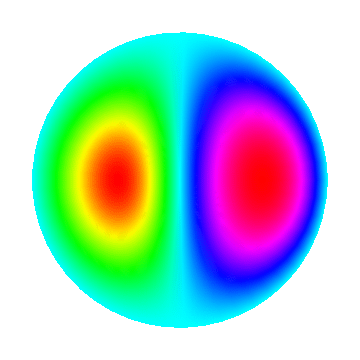
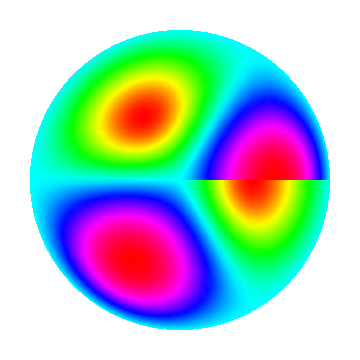
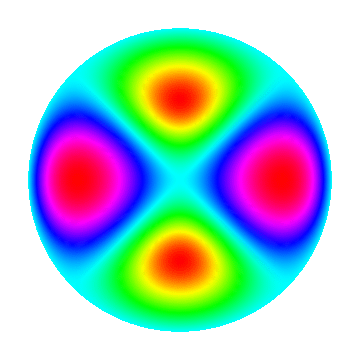
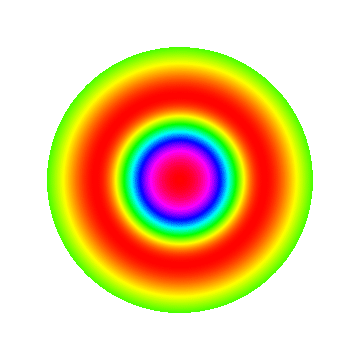
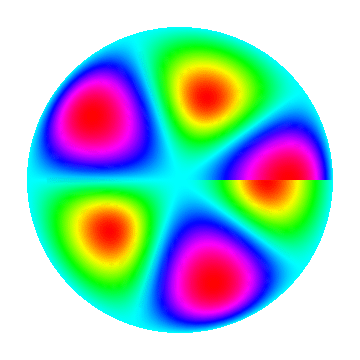
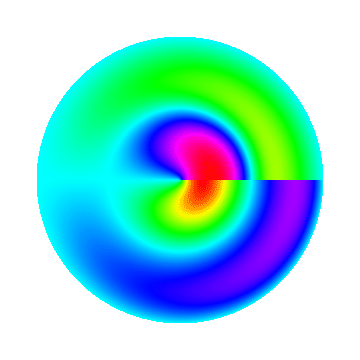
The Problem
\[\int_\Omega a\nabla u\cdot\nabla v\,dx=\lambda\int_\Omega a uv\,dx\]
Let \(\Omega\subset \mathbb{R}^2\) be the unit disk, divided into four quadrants; and \(a=\kappa^2\;,\;\kappa>1\) in the first and third quadrant, while \(a=1\) in the second and fourth quadrants.
